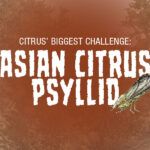Shield Citrus Trees from Deadly Citrus Greening
Properly managing Asian citrus psyllids (ACP) could shield your citrus groves from Huanglongbing (HLB) devastation.

Huanglongbing (HLB), or citrus greening, is a bacterial disease that can significantly damage or kill citrus trees. HLB is tough to diagnose; by the time it’s recognized, HLB has likely spread to many surrounding trees. Even worse: there’s no known cure for the bacterium. You can gain the upper hand against HLB by controlling its carrier, Asian citrus psyllid (ACP).
The Sneaky Symptoms of HLB
During the first year of infection, trees show no signs of HLB but ACP can still take up the bacterium and spread it to other trees. When symptoms do begin to manifest, they’re easily mistaken as signs of nutrient deficiency, since HLB impedes the tree’s vascular system which inhibits the movement of nutrients. Symptoms include leaf yellowing, misshapen fruit that do not ripen, premature fruit drop and root dieback.
Asian Citrus Psyllid and HLB
The reproductive and feeding habits of ACP make it a perfect carrier of the bacterium that causes HLB. When an infected psyllid feeds on a citrus tree’s leaves and stems, it creates a localized infection and transmits the bacterium into the tree. The bacterium quickly spread throughout the plant from the point of infection.
Female psyllids lay eggs in the same region where they feed. If the nymphs of infected females begin feeding on the infected area of the tree, they’ll acquire the bacterium, molt to the winged adult stage and disperse, taking the disease along with them. They’ll then carry it for the rest of their lives, traveling miles by air currents or as hitchhikers on harvested fruit.
Managing Asian Citrus Psyllid
Without a cure for HLB, controlling ACP is the primary strategy to prevent its spread. First, prioritize scouting for ACP and look for the winged adult insects as well as the yellow-bodied nymphs. ACP are often found feeding on newly developed leaves when flush is forming. If ACP populations are present, apply an insecticide like Minecto® Pro to help control the pest. If you suspect that trees have been fed upon by ACP, quickly quarantine them to prevent the spread of HLB.
2 Min Read
- Huanglongbing (HLB), or citrus greening, is a dangerous bacterial disease in citrus trees.
- HLB is spread by Asian citrus psyllids (ACP).
- Manage the spread of HLB by managing ACP populations; Minecto® Pro insecticide could help control ACP.























